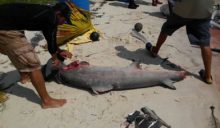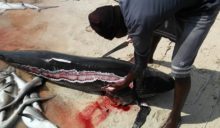The marine conservation community is in an outrage over the recent report of the gill net and long line fishing of sharks occurring near the Lighthouse Reef Atoll. Both MarAlliance and Oceana in Belize have expressed their discontent over the unsustainable practice which in drastically damaging our marine ecosystem. But in the fishermen’s defense, the practice is legal in Belize, as there are no laws against gill net or line fishing, or even fishing for sharks. In fact, the only shark species protected in Belize are Whale Sharks and Nurse Sharks, allowing other species such as Caribbean Reef Sharks and Hammer Heads to be legally killed.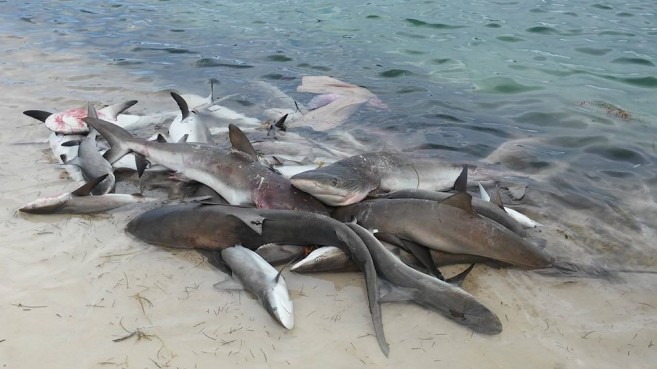
Reports surfaced on Sunday, February 21st, when MarAlliance posted on their social media page images of the shark massacre. The pictures posted represented a portion of a single day’s fishing with nets and longlines, and included at least 32 sharks representing three species, including the endangered great hammerhead and pregnant Caribbean reef sharks. “The sharks were landed at Sandbore Caye and Hat Caye at Lighthouse Reef Atoll. Little to none of the shark meat is consumed in Belize (it’s full of neurotoxic mercury) as it’s traditionally exported to Guatemala. And Hammerheads (meat and or fins) cannot be legally exported across national boundaries without a specific export license that is ultimately approved by the Convention on the International Trade in Endangered Species (CITES). This international convention, to which Belize is a signatory, notes that countries wanting to export listed species (such as the Hammerheads and even conch – both listed under the Appendix II) must prove internationally through a process called a non-detriment finding prepared with Belize’s independent Scientific Authority, that the fishery for the listed species is sustainable. However, fishing for large, long-lived, late maturing and low production sharks including Hammerheads and Caribbean reef sharks are recognized worldwide as Unsustainable,” stated MarAlliance.
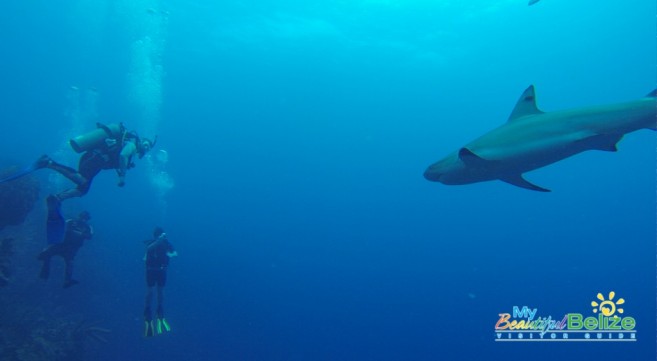
MarAlliance further explained the importance of a healthy shark population to Belize’s marine ecosystem. “These sharks were a mainstay of dive and snorkel tourism at the atoll and help to support many local businesses that rely on tourism for their income. These dead sharks represented millions of dollars in lost revenue, not only to Belize’s tourism sector and the many families and politicians they support, but also to coral reef ecosystem resilience, as these animals play a critical role in maintaining reef health. Live sharks and rays generate far more income to a country than shark fishing,” said Executive Director of MarAlliance, Dr. Rachel Graham.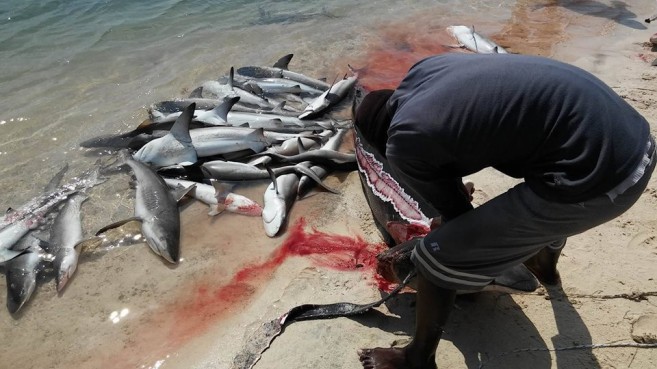
Vice President of Oceana in Belize, Janelle Chanona also commented on the matter. “Since 2010, Oceana has been advocating for a ban on gill nets, and this was out of the result of the feasibility study that we did when we went about selecting campaigns to work on in Belize. So we have been wholly supporting the fishermen of Belize, since we started in Belize in 2010, saying the gill nets are so indiscriminate [that] they need to be banned from use in Belize. I think this is where the use of technology certainly serves to highlight the scope of this issue. Last February we had the instance of a rare Scalloped Hammerhead drowning in a gill net in Hopkins. Two weeks ago we had another Hammerhead, same thing, and I think Rocky Point, off Monkey River, and now MarAlliance posted several photos of Hammerheads, reef sharks, tiger sharks, harnessed using gill nets. Gill nets are used as the primary gear to harvest sharks, and what this is showing you is just a snapshot of what has been happening. If we’re not managing how many sharks are being extracted, that promises to put the entire ecosystem into an imbalance,” said Chanona, who indicated that Belizean fishermen have been asking for a ban on gillnets since 1997.
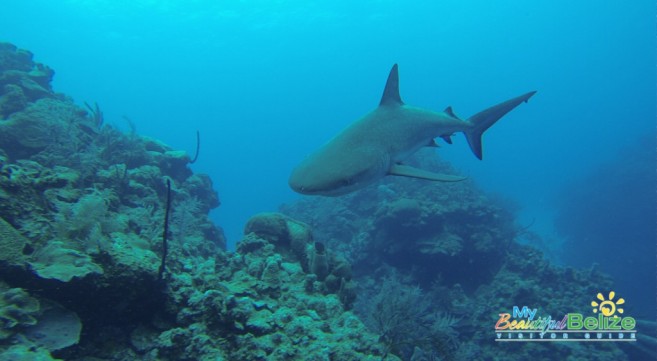
Also supporting the ban on gill nets, long lines and shark fishing is the Belize Game Fish Association. “The Belize Game Fish Association has been working for some time to fight gill nets and to fight shark fishing and, you know, shark fishing is something that worldwide has had a massive impact on the state of the oceans. So we’ve been pushing very hard to try to get shark fishing either extremely regulated, but preferably completely removed from or banned, on the laws of Belize. It has a massive detrimental impact to the economy of Belize. Belize is completely… largely dependent on tourism. A quarter of our GDP comes from tourism and I think one in five jobs are tourism-based or at least benefit from tourism. And removing sharks or using gill nets to capture sharks on our reefs means that tourists can’t go see them, and being able to take the tourists time and time again to Lighthouse Reef, as most people have come to expect, to see sharks is no longer going to be possible if this sort of shark fishing continues, especially using nets because nets. It’s not just removing sharks, it’s going to move everything else along the reef,” said President of the Belize Game Fish Association, Andrew Roe.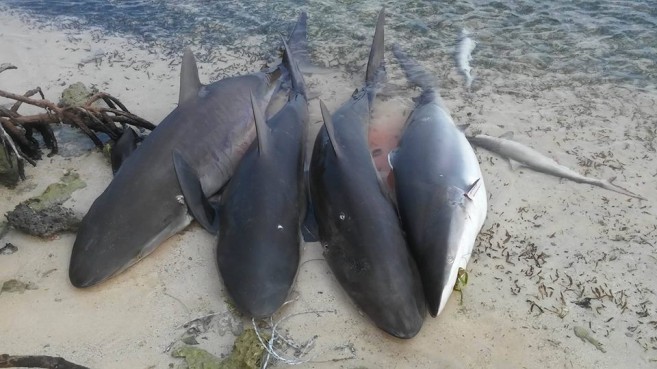
In response to the conservation groups, the Belize Fisheries Administrator Beverly Wade stated that the Government of Belize has launched a National Sharks Working Group and is disappointed at the way MarAlliance handled the matter. “In a recent correspondence to the department for the renewal of that organization annual research license, there is a line there telling us that in the two primary areas where there has been research conducted, and where shark fishing is being done, that population seems stable. This is coming from people who are actually out there carrying out the research. So it’s not that the shark fishing is functioning in a vacuum somewhere. There is no argument that there is a need for us to look at probably more regulations for our shark fishers, but regulations have to also be based on sound information. It is a matter of putting in regulations to address whether there is conservation targets or whether there is sustainable targets at the end of the day. It depends on what is the recommendations coming out in terms of how you move forward with a resource like this,” argued Wade. Wade went on to indicate that the practice is sustainable according to the research conducted by the department.
According to the Belize Fisheries Department, only about 60 fishermen are licensed to catch sharks with the peak season of fishing sharks being November to March. Wade indicated that about 25 thousand pounds of shark meat are exported yearly. The landing sites for shark fishermen are Sandbore Caye, Rocky Point and Robinson Point. “I will say that we are very much disappointed in the treatment of the fishermen. I honestly think that is wrong and from the mere fact that the fishers allowed people to document what they are doing, it shows you that those people knew they were not doing anything that was illegal,” ended Wade.
In an effort to end shark fishing, MarAlliance has launched a petition where they ask Minister of Agriculture, Fisheries, Forestry, the Environment and Sustainable Development, Honorable Gaspar Vega, to ban the use of gill nets and long lines. “The use of unsustainable and unselective fishing gears such as nets and longlines are disproportionately contributing to the decline in Belize’s finfish as well as a host of other protected or threatened species including turtles, manatees, recreational fish, sharks and rays. These gears also represent an inequitable means of fishing where a few fishers capture large numbers of animals at the expense of many fishers who work hard to sustain themselves, their families and the country’s fisheries using sustainable hook and line fishing. Current legislation limiting the number and size of nets is unenforceable and the use of longlines is not restricted. Moreover surveys conducted have shown that the majority of Belize’s fishers support a ban on nets and longlines to reverse fisheries’ decline,” stated Graham.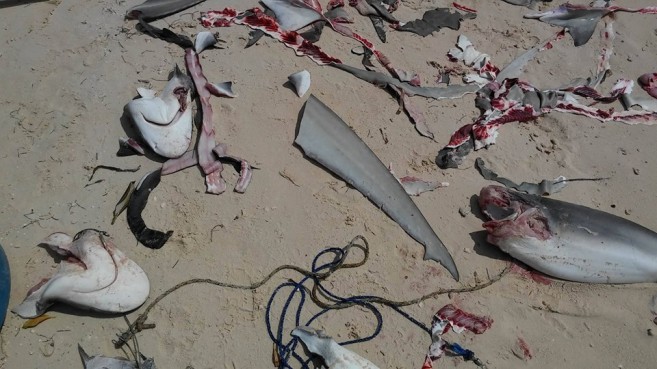
To support the cause and sign MarAlliance petition visit www.change.org/p/hon-gaspar-vega-ban-the-use-of-nets-and-longlines-and-support-equitable-and-sustainable-fishing-in-belize.



